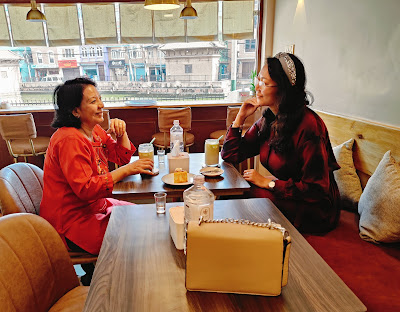I have been meaning to write this part 2, especially after Every Day Phrases by my Mother, the first part was liked by so many and also because, well, the phrases and the dialogues never end with my mother. I did tease her about writing a book or making a scrapbook about all her phrases, but we never got around to it.
So here we are, after almost 4 years, apologies if the Nepal bhasa wordings are incorrect somewhere
Ne tha ne masau Bhwauthau pwa
This is basically saying, not being able to take advantage of the situation or not doing what you are supposed to do at the event. If you get invited somewhere that has food, you should eat there.
Neu twanyu tha yu yethe, jui chwanyu kata pinyu yethe
I have heard this one many times. In the society that we live in, impression and your social image matters a lot, especially when it comes to family prestige. So it does not matter what you do at home but once you step outside, there is this social obligation of dressing appropriately, behaving decently, saying the right things, and being civil.
K mitho bhok mitho
Perhaps when we are hungry, we crave certain things but when you have been really hungry and I mean really hungry, your stomach does not really care what you eat, it just wants to eat. At that point, it does not matter whether you eat a plate of momo or just plain bread, getting rid of your hunger is what matters the most.
Khwale makhu net le
When you hear someone saying the same thing in a different way, it is khwale makhu net le, because it is like hitting on the cheek instead of on the face, but you still get hit on the face.
Halu dha dhunka kuti nya maa la?
Sometimes even describing something in great detail to someone, they still ask how to do one precise thing. For people who do not pay attention to detail or are not listening when told how to do something, this phrase is often told.
Kani naya ghya dhaka teu
For people who have to show off or need to show off even though they have very little in hand. The phrase translates to eating corn and burping ghee is for pretentious people who pretend to have it all but are about all talk.
Anyhow, kaam chalau
Work with what you have, make adjustments and be on your way. The priority is to get your work done. This is perhaps what is most important in everyday life and what is going to make you prepared when things get rough.
Hali ta chhaka likha swaimakhu
Perhaps another one of my favorites and a sort of Nepal bhasa version of “ Look before you Leap”. Sometimes, people react way too fast before even completely understanding the situation which is why it is important to look and understand before you react about something.
I read somewhere recently that a daughter growing up is all about understanding her mother, and it could not be truer. These are the phrases over the top of my head, right now, simple yet giving you a life lesson in the most subtle way.

Comments
Post a Comment